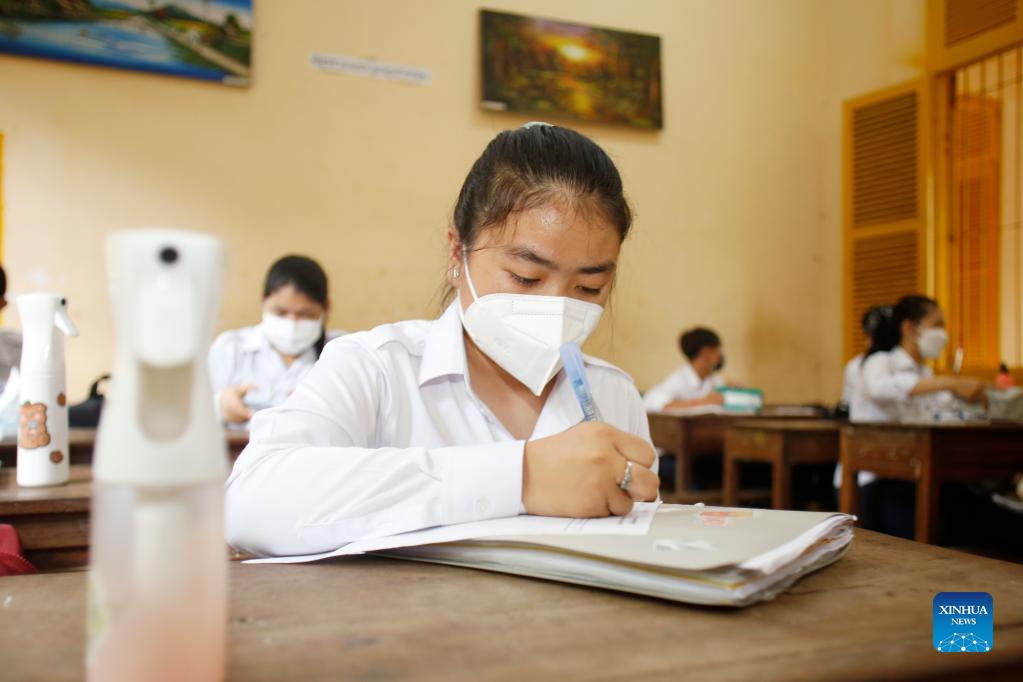Schools in Cambodia reopen gradually after majority inoculated with Chinese vaccines
Students wearing face masks practice social distancing in class at the Preah Sisowath High School in Phnom Penh, Cambodia, Sept. 15, 2021. Secondary and high schools in Cambodia reopened gradually on Wednesday after the majority of the population in the Southeast Asian nation have been vaccinated against COVID-19. (Photo by Sovannara/Xinhua)
PHNOM PENH, Sept. 15 (Xinhua) -- Secondary and high schools in Cambodia reopened gradually on Wednesday after the majority of the population in the Southeast Asian nation have been vaccinated against COVID-19.
At the Preah Sisowath High School in capital Phnom Penh, students had properly worn facemasks while entering the school and had their body temperatures checked and hands sanitized with alcohol at the entrance.
"We have strictly abided by the standard operating procedures (SOPs) and the number of students in a classroom is limited to a maximum of 15," Sam Kamsann, vice principal of the Preah Sisowath High School, told Xinhua.
"To maintain social distancing, students are also allowed to sit at least 1.5 meters from each other in the classroom," he added.
Dressed in school uniform, white shirt and blue skirt, and wearing a facemask properly, Khun Sopheak, a ninth-grade student at the Preah Sisowath High School, said she was delighted to go back to school after a closure for almost seven months due to the COVID-19.
"I feel relieved now after returning to in-person classes," the 15-year-old girl told Xinhua. "It's stressful to learn online from home because the learning atmosphere is not the same as sitting in a classroom with teachers and classmates."
"Moreover, the Internet is pretty laggy and when it freezes, we miss out on chunks of conversation," she added.
Sopheak said that she had been fully vaccinated with two doses of China's Sinovac COVID-19 vaccine.
"I'm quite confident in the safety, quality and efficacy of the Sinovac vaccine in protecting my life from the COVID-19," she said.
With its total population of 16 million, Cambodia launched a COVID-19 vaccination drive for 10 million adults in February and for nearly 2 million adolescents aged from 12 to under 18 in August.
To date, 9.77 million adults and 1.71 million adolescents had received their first vaccine dose, totally accounting for 71.8 percent of the kingdom's population, according to the Ministry of Health (MoH).
Almost all of the COVID-19 vaccines used in the country's immunization campaigns are China's Sinovac and Sinopharm.
"Without support from China, we would definitely not have had enough vaccines for our people," Cambodian Prime Minister Samdech Techo Hun Sen said recently, adding that Cambodia appreciates China's assistance in helping the kingdom combat the COVID-19 outbreak.
Education Minister Hang Chuon Naron said in a statement on Monday that teachers and students must be vaccinated and must show their vaccination cards before entering schools.
"Unvaccinated educators and students should not be allowed to enter the school campuses, but they can continue teaching and learning online," he said.
The minister added that a classroom or a school will be temporarily closed if there is a transmission, and a report must be made to relevant authorities for immediate action.
Li Ailan, representative of the World Health Organization (WHO) to Cambodia, welcomed the gradual reopening of the schools, saying that it was timely and wise.
"Evidence shows that young children and schools are not major drivers of the COVID-19 transmission globally, including in Cambodia," she told Xinhua.
"While children can get infected from the virus, they are less likely to develop severe disease or die compared with adults, especially compared with the elderly," she added.
Li said the negative impacts of prolonged school closures would be huge, including losses in physical activity, mental health and learning, as well as an additional burden to working parents.
"While the risk of outbreaks in schools is not zero, it can be managed. Having a COVID-19 response in place for schools is essential so that any COVID-19 cases are detected and responded to quickly to prevent further spread," she said.
Foroogh Foyouzat, representative of the United Nations Children's Fund (UNICEF) in Cambodia, attributed the school reopening to the incredible progress the government has made in rolling out COVID-19 vaccinations.
"The biggest risk of all would be children not returning to school soon. Global evidence shows that the longer children remain out of school, the less likely they are to go back," she told Xinhua.
"They may feel that they have fallen too far behind to ever catch up, or their families may have become too reliant on extra income children provide through working. Every day we delay, these obstacles grow," she said.
Foyouzat suggested that schools in areas with low infection rates be opened first, with limited classroom sizes and a strong focus on hygiene and safety measures that have been proven to prevent most infections.
 |
Photos
Related Stories
- Vaccination efforts geared up in U.S. as COVID-19 kills 1 in 500 Americans
- Ghanaian man works as Chinese community volunteer during coronavirus fight
- China might vaccinate most of world: media
- China updates mass testing protocol to better cope with Delta variant
- Putin to self-isolate in connection with COVID-19 cases
Copyright © 2021 People's Daily Online. All Rights Reserved.











